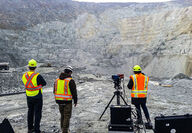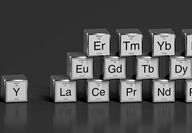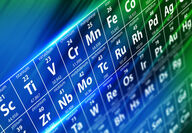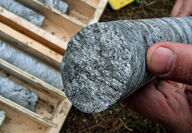Sorted by date Results 51 - 75 of 137

After raising C$10 million earlier this year, Graphite One Inc. is collecting the final bits of data needed for a prefeasibility study that details the company's vision to establish a United States supply chain for the coated spherical graphite used as an anode material in the lithium-ion batteries that power electric vehicles and store intermittent renewable energy. The first segment of this supply chain is the world-class Graphite Creek mine project about 35 miles north of...

While copper did not make it onto the list of 35 minerals and metals critical to the United States, the red metal's criticality to the global transition to renewable energy and electric mobility cannot be overstated. No matter which battery chemistries power tomorrow's electric vehicles, what renewable energy solutions recharge those EVs, or if rare earth magnets are used to generate that electricity and propel those vehicles more efficiently, any path to a decarbonized... Full story

Alaska contains minerals essential to the national defense, renewable energy and electronics industries. Finding those minerals, however, can be difficult in such a vast and geologically challenging state. Hyperspectral imagery can help as Alaska's summer exploration season approaches. The University of Alaska Fairbanks Geophysical Institute has the only hyperspectral imaging facility in the state at its Hyperspectral Imaging Laboratory created in 2014 as the brainchild of... Full story

From a world-class graphite deposit in the Northwest to rare earths on the Southeast Panhandle, Alaska has the potential to offer a sustainable and secure supply to meet the coming explosive demand for the minerals and metals crucial to the renewable energy and electric vehicle sectors in North America and around the globe. International Finance Corporation, part of the World Bank Group, estimates that this shift to low-carbon energy and electric mobility will create nearly... Full story

Rhenium is exceptionally resistant to heat and wear, characteristics that make it a vital ingredient in superalloys used in jet and industrial gas turbine engines. "The high-temperature properties of rhenium allow turbine engines to be designed with finer tolerances and operate at temperatures higher than those of engines constructed with other materials," the United States Geological Survey penned in a fact sheet on the critical metal. "These properties allow prolonged engine... Full story

The Alaska Industrial Development and Export Authority unanimously passed a resolution authorizing the formalization of a preliminary due-diligence process for a potential US$3 million to US$5 million investment for the development and commercial-scale operation of the rare earths separation facility Ucore Rare Metals Inc. plans to build near the Southeast Alaska port town of Ketchikan. Development of this Alaska Strategic Metals Complex, or Alaska SMC, is the first step towar... Full story

Whether it is the exponential growth in electric vehicles traveling global highways, the massive need for storing energy at solar and wind electrical generating facilities, or cutting the cords on our electronic devices, the world is becoming increasingly dependent on lithium-ion batteries. And this is driving up the demand for cobalt, a critical safety ingredient in the cathodes of these energy storage cells. "Globally, the leading use is in the manufacture of cathode materia... Full story

Cans, cups, roofs, and foil hats are likely the first things that come to mind when thinking about tin – none of which conjure images of a metal that should be considered critical to a modern country like the United States. According to a study carried out by Massachusetts Institute of Technology, however, tin is the metal expected that be most impacted by new technologies. Commissioned by Rio Tinto, the MIT study found that tin beat out more likely technology metals candidate... Full story

Considering the global shift to low-carbon energy and electric mobility, copper is the most vital metal not on the United States Geological Survey's list of 35 minerals and metals considered critical to America's economic wellbeing and security. Copper's importance is due to the rapidly emerging electric vehicle, wind turbines and photovoltaic (PV) solar technologies need a lot more copper than the combustion cars and power plants they are replacing. It is estimated that the... Full story

Best known for its ability to resist heat and corrosion, antimony is in a wide array of consumer goods – from paints and plastics to batteries and wind turbines. This critical mineral is also used to make clearer glass for smartphones, computer screens and solar panels. "Today, antimony is used in lead-acid storage batteries for backup power and transportation; in chemicals, ceramics, and glass; in flame-retardant materials; and in heat stabilizers and plastics," the U.S. G... Full story

The six platinum group elements – platinum, palladium, rhodium, ruthenium, iridium, and osmium – have one foot firmly planted in the realm of precious metals while the other is firmly established in the industrial sectors. While being amongst the rarest metals on the planet already makes PGE's highly valued for jewelry and bullion, their applications in the automotive, petrochemical, and electronics industries are catalysts that drive the price of these industrious pre... Full story

Niobium and tantalum are nearly identical critical mineral twins with unique personalities that takes them on separate career paths in the defense, energy, high-tech and medical sectors. "The leading use of niobium is in the production of high-strength steel alloys used in pipelines, transportation infrastructure, and structural applications," the United State Geological Survey penned in a 2018 report on the indispensable twins. "Electronic capacitors are the leading use of... Full story

America's supply of tungsten, an extremely durable metal that is vital to a broad range of American industrial sectors, is at high-risk. A recent U.S. Geological Survey assessment to identify which mineral commodities are most at risk to supply disruptions ranked tungsten near the top of the list – alongside rare earth elements, cobalt and graphite, platinum group metals and tungsten. Like many of its neighbors at the top of the mineral commodity supply risk list, much of the... Full story

The United States imported more than 90% of the 1.4 million metric tons of titanium minerals it consumed during 2019. What the mass majority of this critical mineral was used for, however, may come as a surprise. While titanium's lightweight and extreme durability make it an excellent material for aircraft and high-performance sporting equipment, more than 90% of this mineral mined each year is used to impart a stark whiteness to a surprisingly wide variety of consumer goods w... Full story

A semiconductor that will melt in the palm of your hand and has the ability to convert electricity directly into laser light, gallium is a cool critical metal that is an important ingredient in light emitting diodes (LEDs), new generation smartphones, thin-film solar cells, and medical devices. "The development of gallium arsenide as a direct band-gap semiconductor in the 1960s led to what are now some of the most well-known uses of gallium – in feature-rich, a... Full story

When you consider the 17 rare earths and six platinum metals individually, more than 50 of the elements on the periodic table have been deemed critical to the economic wellbeing and security of the United States, a list that worries the White House and many policymakers in Washington, D.C. To sort the hierarchy of this expansive list, the U.S. Geological Survey has developed a tool that helps identify which mineral commodities lying at the crux of America's manufacturing... Full story

Due to their vital importance to American manufacturing and the fact that 100% of U.S. supply comes from overseas, primarily China, rare earth elements top the list of minerals and metals deemed critical to the United States. When the U.S. Geological Survey plugged in 52 critical mineral commodities into a recently developed supply risk tool, six rare earth elements – dysprosium (No. 1), yttrium (No. 2), neodymium (No. 3), lanthanum (No. 5), cerium (No. 6) and praseodymium (... Full story

In addition to dealing a major blow to the economy, the COVID-19 pandemic has shined a spotlight on a chink in the United States' economic and security armor – an overreliance on foreign countries for the minerals and metals that lie at the frontend of American supply chains. "The COVID-19 pandemic has shown how delicate our supply chains are and that should be a wakeup call for all of us," Senate Committee on Energy & Natural Resources Chair Lisa Murkowski, R-Alaska, said dur... Full story

With it becoming increasingly apparent that Joe Biden will be confirmed as the 46th President of the United States, Alaska Sen. Lisa Murkowski believes the coming years will be "interesting times" for the state's resource sectors. "There is near certainty that he is going to be taking office on Jan. 20, 2021," Alaska's senior senator said, referring to Biden, during the Resource Development Council for Alaska annual convention. "If he follows through on some of his campaign... Full story

The U.S. Geological Survey and Association of American State Geologists have approved $1.1 million of funding for mapping and geological surveys aimed at gaining a better understanding of Alaska's critical minerals potential. This funding includes $634,000 in grants to the Alaska Division of Geological & Geophysical Surveys for geologic mapping and geochemical analyses for an area of the Western Tanacross region near Alaska's eastern border with Canada's Yukon; and $500,000...

Graphite One Inc. Oct. 1 said President Donald Trump's declaration that the United States' heavy reliance on foreign nations for critical minerals is a national emergency highlights the importance of the company's plans to establish a domestic graphite supply chain by developing a mine at its Graphite Creek deposit in Alaska. The U.S. is 100% dependent on imports for graphite, which is currently the primary anode material in the lithium-ion batteries that power smartphones,... Full story

With the federal permitting process coming to a close, it is becoming increasingly likely that a mine developed at the world-class Pebble project in Southwest Alaska could become a significant domestic source of copper, gold and other metals demanded by America's manufacturing sectors. U.S. Army Corps of Engineers, the lead federal regulator for permitting the Pebble Mine under the National Environmental Policy Act (NEPA), published the final environmental impact statement... Full story

With more than half of Alaska's entire population living within its region, Cook Inlet Region Inc., more commonly known as CIRI, is the most metropolitan of the 12 landholding Alaska Native regional corporations. While CIRI has leveraged its urban position with retail developments such as Tikahtnu Commons, an enormous retail and entertainment center on the outskirts of Anchorage, the Southcentral Alaska regional corporation also has oil and gas, renewable energy and mining... Full story

From helmet mounted radios to laser guided missiles, rare earth elements (REE) are an essential ingredient to the advanced hardware used by the U.S. military. These high-tech metals, however, are not produced in America, forcing the Pentagon to depend primarily on China for its supply. As part of a joint armed forces effort to establish a domestic source of rare earths, the U.S. Army is looking to invest in the processing facilities needed to ensure a reliable supply of these... Full story

In a recent letter to the White House, Alaska Governor Michael Dunleavy has requested that U.S. President Donald Trump consider designating the Graphite Creek mine project and associated processing facility as a high-priority infrastructure project under Executive Order 13766, signed by Trump shortly after he took office in 2017. "Graphite Creek is the largest deposit of graphite in the nation, and would be a superior domestic supply of this critical mineral, which is...